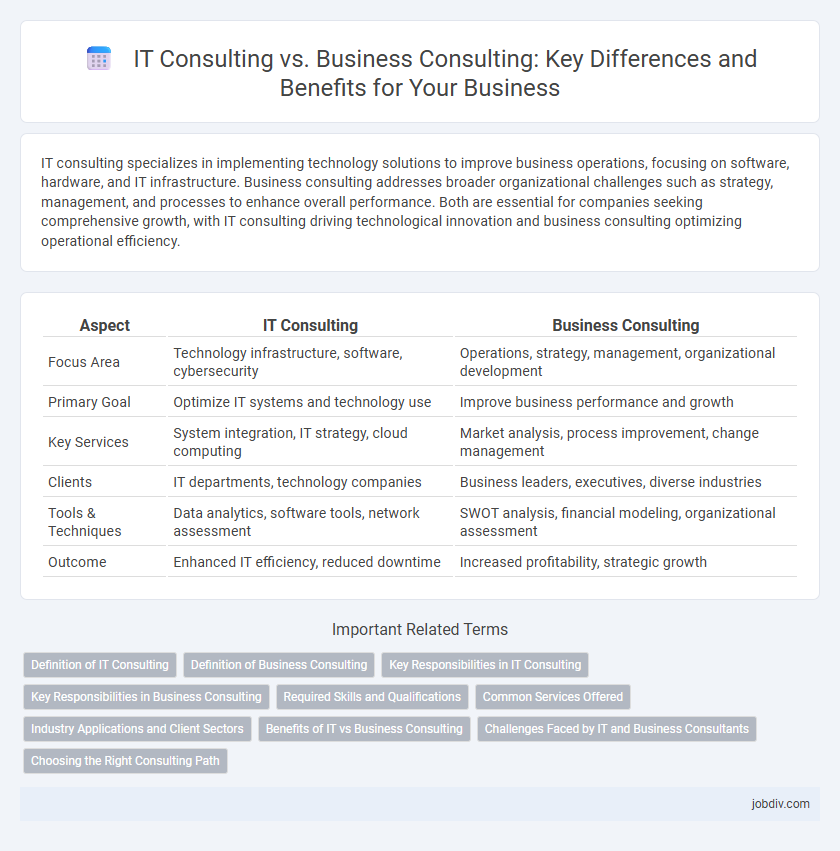IT consulting specializes in implementing technology solutions to improve business operations, focusing on software, hardware, and IT infrastructure. Business consulting addresses broader organizational challenges such as strategy, management, and processes to enhance overall performance. Both are essential for companies seeking comprehensive growth, with IT consulting driving technological innovation and business consulting optimizing operational efficiency.
Table of Comparison
| Aspect | IT Consulting | Business Consulting |
|---|---|---|
| Focus Area | Technology infrastructure, software, cybersecurity | Operations, strategy, management, organizational development |
| Primary Goal | Optimize IT systems and technology use | Improve business performance and growth |
| Key Services | System integration, IT strategy, cloud computing | Market analysis, process improvement, change management |
| Clients | IT departments, technology companies | Business leaders, executives, diverse industries |
| Tools & Techniques | Data analytics, software tools, network assessment | SWOT analysis, financial modeling, organizational assessment |
| Outcome | Enhanced IT efficiency, reduced downtime | Increased profitability, strategic growth |
Definition of IT Consulting
IT consulting involves advising organizations on leveraging information technology to achieve business goals, including systems integration, software development, and IT infrastructure optimization. IT consultants assess current technology frameworks and recommend solutions to enhance efficiency, security, and scalability. Unlike business consulting, which focuses on overall organizational strategy, IT consulting centers specifically on technology-driven improvements and digital transformation initiatives.
Definition of Business Consulting
Business consulting involves providing expert advice to organizations aiming to improve overall performance, operational efficiency, and strategic development across various functional areas such as management, marketing, and finance. Unlike IT consulting, which primarily focuses on technology solutions and IT infrastructure, business consulting addresses broader organizational challenges and growth strategies. Consultants analyze current business processes, identify issues, and recommend comprehensive plans to enhance profitability and market competitiveness.
Key Responsibilities in IT Consulting
IT consulting primarily involves analyzing a company's technology infrastructure to optimize IT systems, ensuring alignment with business objectives through strategic planning and implementation of software solutions. Key responsibilities include evaluating IT processes, recommending technology upgrades, managing cybersecurity risks, and providing support for digital transformation initiatives. Consultants also lead cloud migration projects, system integration, and IT governance to enhance operational efficiency and data management.
Key Responsibilities in Business Consulting
Business consulting focuses on analyzing organizational processes, identifying inefficiencies, and developing strategic solutions to improve overall business performance. Key responsibilities include market analysis, financial planning, change management, and aligning business strategies with client goals. Consultants work closely with leadership teams to drive growth, optimize operations, and enhance competitive advantage.
Required Skills and Qualifications
IT consulting demands strong technical expertise in software development, cybersecurity, and cloud computing, alongside certifications such as CISSP, PMP, or AWS Certified Solutions Architect. Business consulting requires profound knowledge in strategic planning, financial analysis, and organizational change management, often supported by qualifications like MBA or Six Sigma certification. Both fields emphasize analytical thinking, problem-solving, and effective communication, but the technical depth in IT consulting contrasts with the strategic and operational focus in business consulting.
Common Services Offered
IT consulting typically includes services such as technology strategy development, system integration, cybersecurity assessment, and IT infrastructure optimization. Business consulting often focuses on market analysis, organizational change management, operational efficiency, and financial advisory. Both consulting types share common services like process improvement, risk management, and strategic planning to enhance overall business performance.
Industry Applications and Client Sectors
IT consulting primarily targets technology-driven industries such as finance, healthcare, and retail, focusing on digital transformation, system integration, and cybersecurity solutions. Business consulting serves a broader range of client sectors including manufacturing, logistics, and education, emphasizing strategic planning, operational efficiency, and organizational change management. Companies often engage IT consulting for specialized technology implementations, while business consulting addresses holistic business challenges across diverse industry applications.
Benefits of IT vs Business Consulting
IT consulting drives technological innovation, enhances cybersecurity, and optimizes IT infrastructure to improve operational efficiency. Business consulting focuses on strategic planning, organizational development, and market analysis to boost overall business performance and competitiveness. Leveraging IT consulting ensures seamless digital transformation, while business consulting aligns corporate goals with market demands for sustainable growth.
Challenges Faced by IT and Business Consultants
IT consultants often grapple with rapidly evolving technologies and the need to integrate complex systems seamlessly, while ensuring cybersecurity and data integrity. Business consultants face challenges in aligning organizational change with strategic goals and managing stakeholder resistance during transformation initiatives. Both disciplines require strong problem-solving skills and adaptability to navigate dynamic environments and deliver sustainable client value.
Choosing the Right Consulting Path
IT consulting centers on leveraging technology to improve system efficiency, cybersecurity, and digital transformation, while business consulting focuses on optimizing organizational processes, strategy, and market positioning. Choosing the right consulting path depends on a company's priority--whether enhancing technological infrastructure or driving overall business performance and innovation. Understanding specific goals and challenges helps determine whether IT expertise or broad business acumen will deliver the most value.
IT Consulting vs Business Consulting Infographic

 jobdiv.com
jobdiv.com